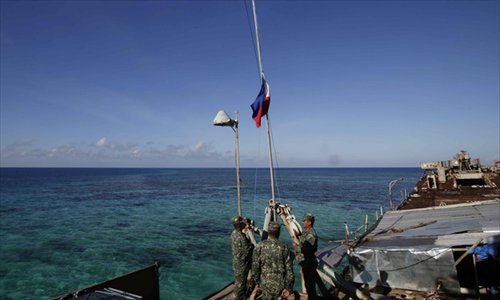China stands firm against Manila sea plea to intl court

Philippine Marines raise the Philippine flag on the dilapidated navy ship LT57 BRP Sierra Madre at the disputed Ren'ai Reef in the South China Sea on Sunday. On Saturday, China Coast Guard attempted to block the Philippine government vessel AM700 carrying fresh troops and supplies, but the latter managed to dock beside the ship to replace troops who were deployed several months ago. Photo: AP
China on Sunday said it would not accept international arbitration over the South China Sea that was unilaterally filed by the Philippines, after Manila formally submitted a plea to the United Nations in disregard of China's warnings.
In a statement, China's foreign ministry spokesman Hong Lei on Sunday urged the Philippines to fully implement the Declaration on the Conduct of Parties in the South China Sea (DOC) signed by China and ASEAN countries, and come back on the right track of resolving the dispute through bilateral negotiation.
Hong made the remarks after Manila filed its memorandum with the International Tribunal on the Law of the Seas.
Manila instituted arbitration proceedings against China under the United Nations Convention on the Law of the Sea (UNCLOS) with regard to disputes between the two countries in the South China Sea in January 2013.
The Philippines Foreign Secretary Albert del Rosario said on Sunday that Manila does not expect the tribunal to reach a decision before the end of 2015.
China has a solid law basis to refuse the arbitration, Hong said, noting the country made a statutory statement in 2006 to the UN, making clear that the relevant disputes do not apply to arbitration procedure.
Article 298 of UNCLOS allows signatories to exempt themselves from mandatory settlement of disputes over sea delimitation and territorial disputes.
Chinese President Xi Jinping said in a speech in Berlin on Friday that China will not provoke trouble regarding territorial disputes in the South China Sea, but it does not fear trouble provoked by others. He made it clear that China stands firm on safeguarding national interests when it comes to sovereignty and territorial integrity, the Xinhua News Agency reported.
Observers said that the Filipino government is internationalizing the dispute by resorting to legal proceedings.
"However, UNCLOS cannot determine sovereignty right or solve territorial disputes," Zhou Hongjun, dean of the International Law Faculty at the East China University of Political Science and Law, told the Global Times on Sunday.
He added that the arbitration tribunal has no right to interfere in sovereignty issues.
The "nine-dash line" was drawn in 1947 and officially recognized by the Chinese government in 1958, but the UNCLOS was adopted in 1982. According to the principle of inter-temporal law, the nine-dash line should not be bound by UNCLOS, Zhou noted.
Abigail Valte, spokeswoman for President Benigno Aquino, said earlier that Manila was aware the UN tribunal may not be able to enforce its ruling if it decides against China, but "at least assuming that a favorable decision [for the Philippines] is rendered, then that is additional weight for the Philippine position."
Experts made similar estimations, noting repercussions for China couldn't be ruled out if the tribunal supports Manila's plea.
"Although China is not bound to the arbitral decision, we have to worry about some possible difficulties it might bring to solve existing sea disputes and the negotiation for a code of conduct in the South China Sea," Wang Xiaopeng, a maritime border expert at the Chinese Academy of Social Sciences, told the Global Times.
Wang said if the ruling is favorable to the Philippines, other countries may make use of the result to challenge China's sovereignty of other disputed islands.
"So we should enhance our combat capability at sea and carry out routine sea patrols as well as sign joint development agreements with neighbors as soon as possible to isolate the Philippines," he said.
Philippines experts said that the country must be prepared for economic sanctions and other forms of diplomatic reprisals by China after it filed the memorandum, local media Manila Bulletin reported.
China's foreign ministry had warned earlier that the Philippines should stop going any further down the wrong track so as to avoid further damage to its relations with Beijing.